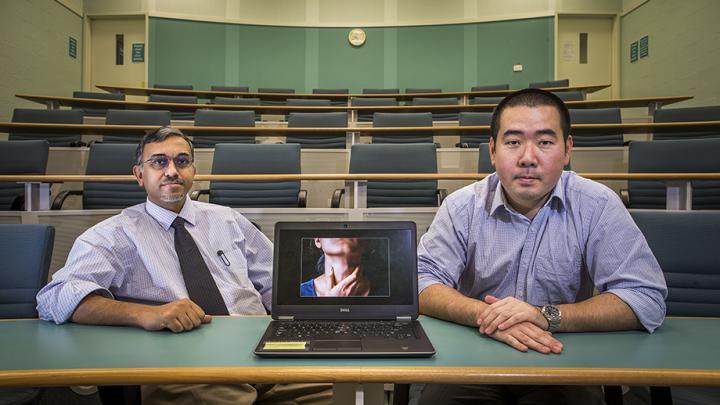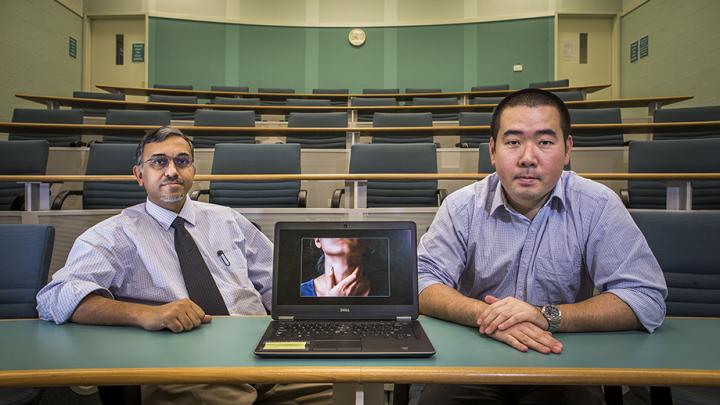
Research led by The Australian National University (ANU) has found doctors around the world are over diagnosing the most common thyroid cancer, creating an artificial epidemic that costs billions of dollars each year in unnecessary medical costs.
Lead researcher Associate Professor Suhail Doi said diagnoses of differentiated thyroid cancer globally had increased three-fold during the past 25 years despite no change to the disease’s low death rate.
“Overly meticulous examinations are detecting the condition in the early stages and resulting in unnecessary surgeries,” said Dr Doi, a clinical epidemiologist at the ANU Research School of Population Health.
“Active monitoring rather than intervention is appropriate in many cases, similar to how doctors treat prostate cancer today,” said Dr Doi, who is also an endocrinologist.
He said differentiated thyroid cancer mainly involves papillary and follicular tumours that don’t usually progress to clinical forms of cancer.
Around 2,500 new cases of differentiated thyroid cancer will be diagnosed in Australia this year.
Thyroid cancer surgery has substantial consequences for patients. Most patients must receive lifelong thyroid-replacement therapy, and some have complications from the procedure, including damage to nerves and surrounding glands.
Dr Doi said the research findings, published in the Journal of Clinical Oncology, would inform clinical guidelines around the world on appropriate treatment for differentiated thyroid cancer, and also help to educate the public about the condition.
“People with this type of thyroid cancer can sometimes live until normal life expectancy and usually die from other causes, so there is no point intervening if the cancer is acting in a benign way and not causing any problems,” Dr Doi said.
“Only some of these cases require treatment if and when the condition progresses to clinical forms of cancer.”
In 2019, the projected medical care costs for differentiated thyroid cancer in United States is estimated to be more than US$3 billion.
“The medical costs for differentiated thyroid cancer in Australia could be about $US300 million in 2019, if we extrapolate from the US projection,” Dr Doi said.
Dr Doi and his colleagues analysed international autopsy data, including from regions that had high and low instances of differentiated thyroid cancer, over six decades from the 1960s.
They found that incidental differentiated thyroid cancer has remained unchanged, confirming for the first time that the epidemic has been driven by increasing detections of cancer.
“Ultimately, this research will help improve thyroid cancer patients’ quality of life and reduce avoidable burden on health systems.”
###
Other co-authors of this study are ANU PhD student Luis Furuya-Kanamori, Dr Katy Bell from University of Sydney, and Justin Clark and Professor Paul Glasziou at Bond University.
Global trends:
- In Australia, during 1982-2012, diagnoses of differentiated thyroid cancer increase 3 times in women and 2 times in men (Source: Cancer Australia).
- In the United States, during 1975-2013, diagnoses of differentiated thyroid cancer increased 3 times (Source: US National Cancer Institute).
- In Canada, during 1986-2015, diagnoses of differentiated thyroid cancer increased 4.5 times in women and 3 times in men (Source: Canadian Cancer Society).
- In the United Kingdom, during 1979-2013, diagnoses of differentiated thyroid cancer increased 3 times (Source: Cancer Research UK).
- In South Korea, during 1993-2011, diagnoses of differentiated thyroid cancer increased 15 times (Source: Korean Central Cancer Registry).
FOR INTERVIEW:
Associate Professor Suhail Doi
ANU Research School of Population Health
T: +974 6600 1271 (can be contacted before 3pm or after 9pm AEST)
E: [email protected]
Dr Luis Furuya-Kanamori
ANU Research School of Population Health
M: +61 487 448 584
E: [email protected]
FOR MEDIA ASSISTANCE:
Will Wright
T: +61 2 6125 7979
M: +61 478 337 740
E: [email protected]
Media Contact
Suhail Doi
[email protected]
974-660-01271
@ANUmedia
http://www.anu.edu.au/media
The post Research reveals artificial thyroid cancer epidemic appeared first on Scienmag.





